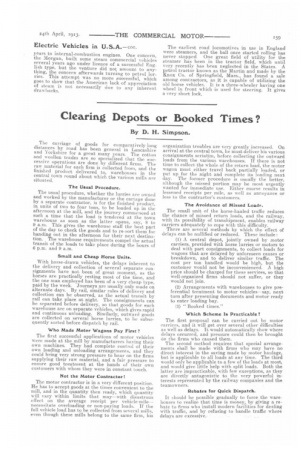Clearing Depots or Booked Times ?
Page 13

If you've noticed an error in this article please click here to report it so we can fix it.
By D. H. Simpson.
The carriage of goods for comparatively-long distances by road has been general in Lancashire and Yorkshire for a great many years. The cotton and woollen trades are so specialized that the successive operations are done by different firms. The raw material for each firm is collected from, and the finished product delivered to, warehouses in the central town round about which the various mills are situated.
The Usual Procedure.
The usual procedure, whether the lurries are owned and worked by the manufacturer or the cartage done by a separate contractor, is for the finished product, in units of two to four tons, to be loaded up in the afternoon at the mill, and the journey commenced at such a time that the load is tendered at the town warehouse as soon as the latter opens, say, 8 to 9 a.m. This gives the warehouse staff the best part of the day to check the goods and to re-sort them for handing out in the afternoon for their next destination. The warehouse requirements compel the actual transit of the loads to take place during the hours of 6 p.m. and 9 a.m.
Small and Cheap Horse Units.
With horse-drawn vehicles, the delays inherent to the delivery and collection of several separate consignments have not been of great. moment, as the horses are practically resting most of the time, and the one man employed has been of a very cheap type, paid by the week. Journeys are usually only made on alternate days. By rail, similar rules of delivery and collection can be observed, as the actual transit by rail can take place at night. The consignments can be separated before delivery, so that goods for each warehouse are on separate vehicles, which gives rapid and continuous unloading. Similarly, outward goods are collected on several horse lurries, to be subsequently sorted before dispatch by rail.
Who Made Motor Wagons Pay First ?
The first successful applications of motor vehicles were made at the mill by manufacturers having their own machines. They had complete control of their own loading and unloading arrangements, and they could bring very strong pressure to bear on the firms supplying their raw material, and a fair pressure to ensure good treatment at the hands of their own customers with whom they were in constant touch.
Not the Motor Contractor!
The motor contractor is in a very different position. He has to accept goods at the times convenient to the mill, and in the quantity then ready, which quantity will vary within limits that may--with disastrous effect on the average receipt per vehicle-mile-necessitate overloading or non-paying loads. If the full vehicle load has to be collected from several mills, even though these mills belong to the same firm, his
organization troubles are very greatly increased. On arrival at the central town, he must deliver his various consignments seriatim, before collecting the. outward loads from the various warehouses. If there is not time to collect the whole of the return load, the motor wagon must either travel back partially loaded, or put up for the night and complete its loading next day. The former procedure is usually the better, although the missed portion may be most. urgently wanted for immediate use. Either course results in lessened receipts per mile, as well as annoyance or loss to the contractor's customers.
The Avoidance of Missed Loads.
The small unit of the horse-hauled traffic reduces the chance of missed return loads, and the railway, with its possibility of transhipment, enables railway carriers adequately to cope with this difficulty.
There are several methods by which the effect of delays can be nullified or reduced. These include:
(1) A central depot, jointly owned by motor carriers, provided with horse lurries or motors to deal with part consignments, to collect loads for wagons that are delayed by unforeseen causes or breakdown, and to deliver similar traffic. The cost per ton handled would be high, but the customer would not be inconvenienced. A high price should be charged for these services, so that well-organized firms should not suffer, or they would not join.
(2) Arrangements with warehouses to give preferential treatment to motor vehicles—say, next turn after presenting documents and motor ready to enter loading bay.
(a) "Booked times."
Which Scheme Is Practicable ?
The first proposal can be carried out by motor carriers, and it will get over several other difficulties as well as delays. It would automatically show where delays occurred, and pressure could then be brought an the firms who caused them.
The second method requires that special arrangements shall be made with firms who may have no direct interest in the saving made by motor haulage, but is applicable to all loads at any time. The third would only be applicable to a few of the loads at most, and would give little help with split loads. Both the latter are impracticable, with few exceptions, as they are directly antagonistic to the very powerful interests represented by the railway companies and the teamowners.
Rebates for Quick Dispatch.
It should be possible gradually to force the warehouses to realize that time is money, by giving a rebate to firms who install modern facilities for dealing with traffic, and by refusing to handle traffic where delays are excessive.
























